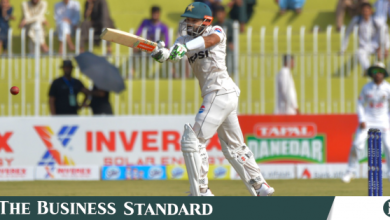‘India may be the best, but we’re aiming for greatness’

Representing Bangladesh in 19 ODIs between 1988 and 1998, Athar Ali Khan has been a prominent figure in the country’s cricketing history.
Following his playing career, he seamlessly transitioned into commentary, beginning just as Bangladesh gained Test status in 2000. With over two decades of experience in the commentary box, Athar Ali has become one of the most respected voices in cricket, often being the lone Bangladeshi representative on international commentary panels. Most recently, he was in Pakistan to commentate on the historic two-Test series against Bangladesh.
In an exclusive interview with The Business Standard, Athar Ali Khan spoke about Bangladesh’s historic Test win against Pakistan, the team’s style of play, his thoughts on Tamim Iqbal joining the commentary panel, and his expectations from the team in the upcoming India tour.
First of all, tell us about your first-hand experience of Bangladesh’s historic Test series win against Pakistan.
I think this is a once-in-a-lifetime experience for everyone in the cricket industry. I still can’t believe that we’ve won not just one but two Test matches against Pakistan, and that too in Pakistan. As the saying goes, if you dream big, your dreams will come true, and this was exactly like that. It was truly sensational. To be honest, I’m lost for words trying to describe these feelings, and I’ve witnessed Bangladesh win some significant matches. I’ve seen the highs and lows—the win against Australia in 2005, India in 2007, the Mount Maunganui Test victory against New Zealand, and Mehidy Hasan Miraz’s rise against Australia and England in 2017. These are all fond memories, but this series win against Pakistan stands out as the finest moment in Bangladesh’s cricketing history, in my opinion.
What are your thoughts on the style of play Bangladesh showcased in both matches?
They truly showed nerves of steel. In both matches, they were on the back foot after the first innings. Pakistan posted a massive total in the first Test, leaving Bangladesh trailing by 448 runs. In the second match, the situation was even more challenging, with the team at 26/6 at one point. To come back from that, and against such an established team, is remarkable. They played with freedom and displayed a different brand of cricket. The collective effort in overcoming these crises, combined with individual brilliance like Litton Kumar Das’s innings, was a joy to watch. Some people are saying Pakistan didn’t play well, but the truth is, they didn’t because we were simply better. We didn’t let them. This series has sent out a strong message: we can, and we will win against the big teams in the future.
Most of the time, you’re the sole representative for Bangladesh in the commentary panel for overseas series or tournaments. How do you prepare yourself for this?
As commentators, we do a lot of research. We study every player on what their recent form is, how they’ve performed in their domestic season, which teams they play for, and their quotes about the matches. There’s really no end to the preparation and research in these scenarios because you also have to consider the coaching staff, the venues, and even the fellow commentators. It’s definitely tough, especially when there isn’t much time between games. But that’s part of the job, and you have to stay ready.
What are your thoughts on the recent circulation of Tamim Iqbal joining the commentary panel for the upcoming India vs Bangladesh series?
I think he’ll be excellent. I have immense respect for him. I’ve already worked with him when he appeared as a guest commentator before, and his command of the language, coupled with his deep knowledge of the game as an experienced batsman with over 15,000 runs, makes him a natural fit. From a personal point of view, I’ll be excited to finally get a new opening partner, since I missed out on opening the innings with him during my playing career and it will be a dream come true. So yes, I think he has all the tools to succeed in commentary.
Do you have any advice for him, given your vast experience in this field compared to him?
I think it comes naturally. I don’t want to sound like a know-it-all, but I think it’s important to stay calm, be natural, and always back your thoughts. I’m sure he already understands this, and I have a strong feeling he’s going to be one of the finest commentators in our country if he puts his mind to it.
What are your expectations for the team as India is considered stronger than Pakistan as an opponent?
We definitely have to keep our expectations high and hope for the best. Yes, we’ve won a historic series, but India’s squad is one of the strongest, if not the best, Test teams in the world right now. This will likely be Bangladesh’s toughest series if you consider everything. But at the same time, India will be studying us, and they can’t afford to underestimate us. Our middle and lower-middle order is performing well, and our pacers are doing exceptionally well, though we will miss Shoriful Islam. Our spinners, especially Shakib Al Hasan, are also in top form—Shakib just delivered a stellar bowling performance in county cricket. While the team could perform better if Shakib returns to form with the bat, we need stability in our top order. Another collective effort across all departments will be crucial against India. Despite the challenge, I believe the confidence we gained from beating Pakistan can fuel us to do something extraordinary in this series. India may be the best team on paper, but we’re not backing down. We’re aiming for greatness, and with the momentum on our side, we know that anything is possible.
How do you think the difference between Kookaburra balls and SG balls will affect Bangladesh’s chances?
Since SG balls are going to be used, they’ve been practising with them for the last two weeks. As professionals, you have to adapt and adjust to any situation quickly. From what I know, SG balls show movement not only when they’re new but also as they age, which could be an advantage for our bowlers if they plan well and adjust accordingly. As for the batsmen, it’s important not to overthink it. They should play to the merit of the delivery and avoid rushing. In Test cricket, you have to be gritty and resilient. I’m sure the team is already discussing these matters, and the coaching staff will have a plan to tackle it. The players just need to back themselves to overcome this hurdle.





